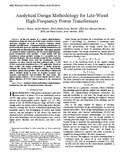Mostrar el registro sencillo del ítem
Analytical design methodology for Litz-wired high-frequency power transformers
| dc.creator | Barrios Rípodas, Ernesto | es_ES |
| dc.creator | Ursúa Rubio, Alfredo | es_ES |
| dc.creator | Marroyo Palomo, Luis | es_ES |
| dc.creator | Sanchis Gúrpide, Pablo | es_ES |
| dc.date.accessioned | 2023-05-09T13:14:39Z | |
| dc.date.available | 2023-05-09T13:14:39Z | |
| dc.date.issued | 2015 | |
| dc.identifier.citation | Barrios, E.L., Ursua, A., Marroyo, L., Sanchis, P. (2015) Analytical Design Methodology for Litz-Wired High-Frequency Power Transformers. IEEE Transactions on Industrial Electronics, 62(4), 2103-2113. https://doi.org/10.1109/TIE.2014.2351786. | en |
| dc.identifier.issn | 0278-0046 | |
| dc.identifier.uri | https://hdl.handle.net/2454/45231 | |
| dc.description.abstract | In the last quarter of a century, high-frequency (HF) transformer design has been one of the major concerns to power electronics designers in order to increase converter power densities and efficiencies. Conventional design methodologies are based on iterative processes and rules of thumb founded more on expertise than on theoretical developments. This paper presents an analytical design methodology for litz-wired HF power transformers that provides a deep insight into the transformer design problem making it a powerful tool for converter designers. The most suitable models for the calculation of core and winding losses and the transformer thermal resistance are first selected and then validated with a 5-kW 50-kHz commercial transformer for a photovoltaic application. Based on these models, the design methodology is finally proposed, reducing the design issue to directly solve a five-variable nonlinear optimization problem. The methodology is illustrated with a detailed design in terms of magnetic material, core geometry, and primary and secondary litz-wire sizing. The optimal design achieves a 46.5% power density increase and a higher efficiency of 99.70% when compared with the commercial one. | en |
| dc.description.sponsorship | This work was supported in part by the Spanish Ministry of Economy and Competitiveness under Grant DPI2010-21671-C02-01 and Grant DPI2013-42853-R, in part by the Public University of Navarra, and in part by Ingeteam Power Technology. | en |
| dc.format.mimetype | application/pdf | en |
| dc.language.iso | eng | en |
| dc.publisher | IEEE | en |
| dc.relation.ispartof | IEEE Transactions on Industrial Electronics, 62(4), 2015 | en |
| dc.rights | © 2014 IEEE. Personal use of this material is permitted. Permission from IEEE must be obtained for all other uses, in any current or future media, including reprinting/republishing this material for advertising or promotional purposes, creating new collective works, for resale or redistribution to servers or lists, or reuse of any copyrighted component of this work in other work. | en |
| dc.subject | Analytical design methodology | en |
| dc.subject | Highfrequency (HF) transformers | en |
| dc.subject | Litz wire | en |
| dc.subject | Photovoltaic (PV) power electronic converters | en |
| dc.title | Analytical design methodology for Litz-wired high-frequency power transformers | en |
| dc.type | Artículo / Artikulua | es |
| dc.type | info:eu-repo/semantics/article | en |
| dc.date.updated | 2023-05-09T13:02:23Z | |
| dc.contributor.department | Ingeniería Eléctrica y Electrónica | es_ES |
| dc.contributor.department | Ingeniaritza Elektrikoa eta Elektronikoa | eu |
| dc.rights.accessRights | Acceso abierto / Sarbide irekia | es |
| dc.rights.accessRights | info:eu-repo/semantics/openAccess | en |
| dc.identifier.doi | 10.1109/TIE.2014.2351786 | |
| dc.relation.projectID | info:eu-repo/grantAgreement/MICINN//DPI2010-21671-C02-01/ES/ | en |
| dc.relation.projectID | info:eu-repo/grantAgreement/MINECO//DPI2013-42853-R/ES/ | en |
| dc.relation.publisherversion | https://doi.org/10.1109/TIE.2014.2351786 | |
| dc.type.version | Versión aceptada / Onetsi den bertsioa | es |
| dc.type.version | info:eu-repo/semantics/acceptedVersion | en |
| dc.contributor.funder | Universidad Pública de Navarra / Nafarroako Unibertsitate Publikoa | es |


